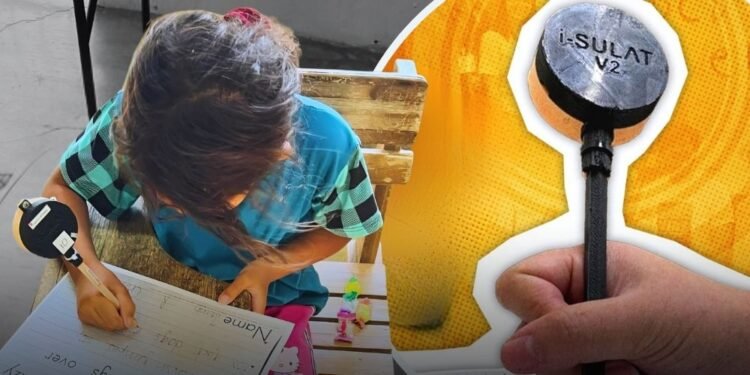A team of researchers from the University of Santo Tomas (UST) has developed a “smart pen” that may help detect early signs of attention-deficit/hyperactivity disorder (ADHD) and other neurodevelopmental or cognitive conditions, simply by analyzing how a person writes.
The prototype is called iSULAT (Intelligence Stroke Utilization Learning Assessment and Testing) was unveiled on May 27, 2025 by the Department of Science and Technology – Philippine Council for Health Research and Development.
Created by engineering and psychology experts from UST, integrates sensors into an ordinary-looking pen. But unlike regular writing tools, this smart pen collects real-time data on a person’s handwriting behavior, including writing pressure, speed, angle, and stroke patterns, which may serve as indicators of cognitive or developmental issues.
According to UST assistant professor and electronics engineer Alexis Duran, the device uses a combination of built-in motion sensors and a machine learning model to analyze these metrics.
The goal: to assist in the early screening of conditions such as ADHD, dyslexia, and mild cognitive impairment, without the need for immediate clinical testing.
A Writing Tool That Reads Between the Lines
Dr. Edison Roxas, project leader of iSULAT, noted that handwriting plays a key role in identifying learning disabilities and mental health disorders. According to him, the therapists who partnered with their team have given positive feedback as it sped up their assessments.
This is to emphasize that the pen is not designed to diagnose patients. Instead, it can act as a pre-assessment tool, providing data that may flag behavioral patterns associated with certain conditions. Once these patterns are identified, individuals can then be referred to specialists for further evaluation.
The researchers tested the pen among 125 participants and found that it was able to detect patterns consistent with clinical symptoms observed in ADHD and other conditions. The pen’s AI model was trained on writing data tagged by psychologists, allowing it to “learn” what to look for in a person’s penmanship.
One key advantage of the tool is that it is non-invasive and does not require the user to change their behavior or undergo stressful testing. Writing naturally, as one would in a classroom or daily journal, already produces enough data for the system to process.
Why This Promising Device Matters
Globally, ADHD remains underdiagnosed — especially among adults — with many individuals unaware they even have it. Early detection can lead to earlier interventions, better coping strategies, and improved quality of life.
In the Philippines, limited access to specialists and social stigma around mental health often make early diagnosis challenging. Tools like the UST smart pen could be a step toward bridging that gap.
While there’s no target date yet for mass production or commercial release, the team is eyeing future partnerships to scale up the technology and potentially integrate it into classrooms, clinics, or mental health programs.
Currently, there are twelve iSULAT smart pens in circulation and they have been piloted in three schools across Luzon and the researchers continue to refine its accuracy, as this may also be a pioneering tool for future studies involving neurological disorders like stroke or Parkinson’s disease.
For now, the UST smart pen remains a research project, but one with promising applications. If further validated, it could become a powerful screening aid, especially in communities where access to psychological services is limited.
The project reflects a broader trend in tech-driven mental health innovation in the Philippines, where academic institutions are increasingly exploring how local, affordable tools can help address long-standing gaps in care.
In a country where handwriting is still very much part of daily life, a pen that can do more than just write — one that might help people understand themselves better — is worth keeping an eye on.












